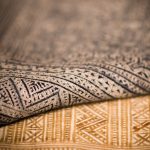Flooring For Your Property: A Guide to Natural Carpets

Natural Carpets are becoming increasingly popular in amongst many design-conscious property owners. Their sustainability factors are popular with eco-aware buyers, and their unique textures offer something different to those of a synthetic carpet. Natural carpets are particularly attractive to homeowners with coastal properties, who are looking to achieve a natural and rustic beach house vibe in their overall design. Here at Floor Factory, we have a range of natural carpets available and can talk you through the various materials in this handy blog.
Suitability
It’s important to note that natural carpets are generally not laid in kitchen or bathroom areas as they don’t tend to react well with high moisture and humidity. For these particular areas, the only option to consider in the natural sphere, would be 100% wool. If you have pets with high shedding coats or regularly damp paws, natural carpets may not be the best choice. Pet fur can become embedded into large weave fabrics, and moisture from your four-legged friends could cause the weave to shrink.
Sisal
This is the most popular natural flooring material, thanks to its rustic appearance and heavy texture. For those who are more familiar with synthetic carpet, Sisal may appear too coarse and rough at first, however it has many benefits. As an incredibly durable option, Sisal is resistant to becoming trodden, even in high traffic areas. Along with this, Sisal can be woven into many different patterns and reacts well to light dying. Overall, it is a very diverse natural flooring material.
Seagrass
Grown on the banks of tropical rivers in Vietnam and China, Seagrass is harvested, processed and woven by hand. Although the process is not controlled by a machine, the price is still competitive with other natural products, and has the most ‘raw’ appearance amongst all natural carpets as it cannot be dyed. Thanks to its natural waxy secretions, Seagrass is more water resistant than Sisal, and has a reflective sheen that adequately brightens most rooms. Seagrass is not suitable for stairs, as its thick, stiff weave doesn’t react well to being bent around corners.
Jute
Jute is the most delicate and intricate of all natural floorings, as it lacks the coarse texture of other options. Because of this, it is far less durable and therefore isn’t really suitable for hallways or other high traffic areas. Save this option for bedrooms, where the material will take less traffic, and the soft texture can be more appreciated. Jute is often compared to tweed, thanks to its lightweight, thin blend and tight weave. Harvested from plants in India, the eco-credentials of Jute are much stronger than the rest.
Coir
As the coarsest material of all, Coir is ideal for stairs thanks to the high levels of grip. Made from coconut husks, Coir is highly organic with wonderful natural qualities. Although it is tough and durable, it is prone to a little wear in high traffic areas, and must be treated for stain protection once laid. The price of this material is very competitive and affordable amongst the natural flooring options, and is a highly popular choice by many.
Wool
As a by-product of sheep farming, wool is collected from the seasonal shearing of the animals, making it 100% sustainable. Wool has many benefits, including its comfortable, soft texture and durability. Wool is incredibly long lasting and has a natural crinkle, giving it excellent ‘bounce back’. This means that wool maintains its full appearance for longer than alternatives.
As natural flooring options continue to grow in popularity, is it worth considering the benefits that can be gained from such materials. To find out more about the range of natural carpets in our collection, please visit our Derby showroom today! Contact the team at Floor Factory with any questions you may have.








